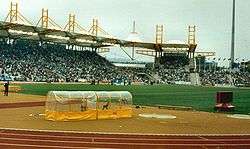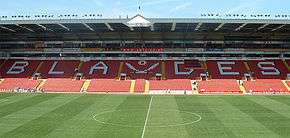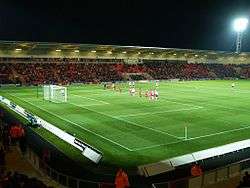Sheffield Eagles
- For the original club founded in 1984 and merged with Huddersfield Giants in 1999, see Sheffield Eagles (1984).
 | |
| Club information | |
|---|---|
| Full name | Sheffield Eagles Rugby Football Club |
| Nickname(s) |
Sheff The Eagles |
| Website | sheffieldeagles.com |
| Colours |
|
| Founded | 1999 |
| Current details | |
| Ground(s) |
|
| Coach(s) | Mark Aston |
| Competition | Championship |
| 2016 RFL Championship | 7th |
| Records | |
| Championship | 2 (2012, 2013) |
| Most capped | 389 - Mark Aston |
| Most points | 2142 - Mark Aston |
Sheffield Eagles R.F.C. is a professional rugby league club in Sheffield, South Yorkshire, England who currently play in the Kingstone Press Championship. The club was formed in 1999 to succeed the original Sheffield Eagles club, which competed in Super League and won the Challenge Cup in 1998.
History
1984–1999: Original Sheffield Eagles
The first Sheffield Eagles club joined the Rugby Football League in 1984 and were founder members of Super League in 1996. In late 1999, the League wanted to lower the number of clubs in Super League. One of the measures they put in place was the option for two clubs to merge for the sum of £1,000,000. Fearing this was the only way to keep rugby league alive in Sheffield, the club accepted an offer from the RFL to merge with another struggling team, the Huddersfield Giants, which became Huddersfield-Sheffield Giants. After only one season, however, the club reverted to, and continues as, Huddersfield Giants.
2000–2005: New Sheffield Eagles
The merger with Huddersfield was not accepted by Sheffield supporters , and so legendary player Mark Aston formed a new Eagles club from scratch, earning a place in the Northern Ford Premiership for the 2000 season, taking Bramley's vacated place.
From 1999 to the present the Eagles have played in the semi-professional leagues, first the Northern Ford Premiership and then the second division of the LHF Healthplan National League. Mark Aston assumed the role of player manager, continuing on the field until 2004, when he officially retired from playing. After the 2004 season Mark replaced his father Brian as chief executive, bringing in a new head coach in Gary Wilkinson at the end of the following year. As soon as the new club was reformed, it vowed to never overstretch its finances to achieve success. This made life difficult as the Eagles were denied the money received by other clubs in the NFP for TV rights as part of the deal that allowed them to re-enter the professional leagues.
2003 brought two club records; Sheffield suffered their record defeat on 2 February 2003 0–88 to Hull. However, on 3 August 2003, London Skolars were the victims as Sheffield Eagles won 98–4, a record victory. In 2003 the team finished top of National League Two and reached the Grand Final, agonisingly losing 13–11 to the Keighley Cougars. Victory would have sent the Eagles into National League One, but this was not to be and a second play-off against the Batley Bulldogs ended in failure for the demoralised squad.
2006–2008: Promotion
Until 2006 the team struggled to match this effort, with key players retiring or being signed by bigger clubs – young players Mitchell Stringer and Andy Raleigh went on to sign for Super League clubs. At the start of the 2006 season Gary Wilkinson was brought in as coach and the team finished in second place, qualifying for the play-offs for the right to join champions Dewsbury Rams in National League One. On 22 September 2006 they beat the Crusaders at the Don Valley Stadium to qualify for the Grand Final for a second time. In the Grand Final on 8 October they beat Swinton Lions 35–10 to be promoted to National League One. To the surprise of many Wilkinson resigned as head coach on 15 October 2006, citing personal reasons. National League One was seen as a springboard to a potential return to Super League, although this would be dependent on the RFL's continuation of the franchising or licensing system. As Sheffield Eagles' chairman Ian Swire, remarked, after the 2006 Grand Final victory, "We showed on Sunday that we can compete, and that in the near- to not-too-distant future we will get back into Super League".
Mark Aston returned as coach in 2007. The 2007 season started slowly for the promoted team but ended with the Eagles defying the bookmakers, who had them as favourites for relegation, by finishing 6th in the league table and qualifying for the play-offs, where they lost a close game to Halifax.
In 2008 the Eagles consolidated their position in National League 1, although they missed the play-offs by one place. Both Jack Howieson (Scotland) and Ged Corcoran (Ireland) represented their countries at the 2008 Rugby League World Cup.
2009–2012: Move to Bramall Lane
In 2009 National League 1 was renamed the Co-operative Championship. The 2009 season started unevenly with incoming International players delayed by visa problems. However, the Eagles rallied to progress to the 5th round of the Challenge Cup and produced consistent performances, gaining at least a losing bonus point from all their League games. Despite a number of long-term injuries, the team finished 3rd only narrowly missing out on 2nd place; their highest finish since the re-launch, and they again qualified for the play-offs. In the play-offs they were expected to easily beat Featherstone Rovers in the first match at Don Valley Stadium. However Rovers surprised many by winning, ending Sheffield's season at the first play-off hurdle.
On 16 October 2009, the Eagles announced they would be moving their home games from the start of the 2010 season to Bramall Lane, home of Sheffield United in a bid to increase attendances and atmosphere at games which now take place on Sunday afternoons. The Eagles moved to Bramall Lane on 11 April 2010, losing by 40–16 to Featherstone Rovers. The attendance of 2,871 was 3 times the average the Eagles achieved at Don Valley Stadium and the club hope to push on from there to achieve a Super League licence. The 2010 season saw the club finish in 6th place, making the play-offs and surprising both Leigh Centurions and Barrow Raiders with away victories before falling to eventual champions Halifax RLFC.
The 2012 season was the Eagles most successful to date, reaching the semi finals of the Northern Rail Cup for the first time and beating Featherstone Rovers 20–16 in the Grand Final to become Championship Champions. The final was a re-match of the 2011 fixture which was the Eagles 1st ever appearance at the final but were beaten soundly on that occasion 40–4. The Eagles defeated Batley, Halifax and Leigh to reach the Grand Final with Scott Turner, Misi Taulapapa, Quentin Laulu-Togagae and Dane McDonald all scoring for the Eagles to bring the trophy back to Sheffield.
The Eagles played 3 home games at Bramall Lane in 2012 with the rest taking place at Don Valley including a crowd on 1,895 watching the opening league game against Swinton at Don Valley, the Eagles' highest crowd there since the Super League era.
2013–present: Post Don Valley
The 2013 season was equally if not more successful that the previous season, reaching the final of the Northern Rail Cup for the first time, losing to Leigh Centurions at the Shay, but more importantly becoming the first side to win back to back Championship Grand Finals by beating Batley Bulldogs 19–12 at Leigh Sports Village to retain the Championship title.
The Eagles moved back to Owlerton Stadium for the 2014 season as the Don Valley Stadium was scheduled for demolition. The Eagles planned to were play at the new Sheffield Hallam University facility at Bawtry Road but unfortunately this was not possible and Owlerton Stadium stepped in at the last minute. Sheffield Eagles announced that they would leave Owlerton for the 2015 season due to new Rugby Football League ground regulations and played the season in nearby Doncaster at the Keepmoat Stadium, home of Doncaster RLFC.
In 2016 it was announced the Eagles would play at Sheffield Hallam University's Sports Park. The first league game played by the professional team there was against Halifax and they won 26–6 to go top of the RFL Championship after just two games.
Colours and badge
Colours
The club adopted the colours of the original Sheffield Eagles, playing in red, yellow and white. The clubs shirts have been predominantly red with either a yellow or white V across the front. Away shirts vary in colour with some being black or white. The 2016 away shirt is white with blue horizontal stripes.
Badge

The original clubs badge was an Eagles head inside a crest with The Eagles across the top and Sheffield Eagles in italics across the bottom. The inside of the crest was yellow with a red border. The new club chose to use a different more updated crest to replace the old dated one. The new more modern crest features an eagle carrying a rugby ball within a circle with Sheffield Eagles around it.
Stadiums
1999–2009, 2011–2013: Don Valley Stadium

The new Sheffield Eagles club replaced the old one at Don Valley. The club stayed at the multipurpose venue, which hosted athletics, football and concerts as well as rugby, for ten years until they moved to Bramall Lane. They returned midway through 2011 until the council announced that the running cost of the stadium were too high and it was only being used for rugby league which on its own didn't generate enough revenue to keep it open and an indoor athletics centre had been built in the city. The stadium was closed and demolished in 2014 to make way for the Olympic Legacy Park.
2010–2011: Bramall Lane

The Eagles moved to Bramall Lane in 2010 in a ground share with Sheffield United in a bid to increase attendances. Attendances rose three times more than what they were at Don Valley in the first year. The Eagles returned to Don Valley midway through 2011 but have played one off games at Bramall Lane since.
2014: Owlerton Stadium

After being left homeless the club moved to the city's greyhound track in Hillsborough where they had previously played games between 1984-1989. The club experienced a dip in form at Owlerton, with there being temporary changing rooms and poor facilities.
2015: Keepmoat Stadium

The club moved out of Sheffield for the first time since the merger with Huddersfield Giants in 1999, when they made the temporary switch to Doncaster. Here they ground shared with Doncaster Rovers and local rivals Doncaster RLFC who were currently playing in the same division which meant the two clubs playing an extra home game when they faced each other.
2016: Sheffield Hallam University Sports Park (Bawtry Road)
The Eagles moved to Sheffield Hallam University's Sports Park on Bawtry Road, Brinsworth, Rotherham in 2016, where the reserves play their home fixtures. Temporary seating was erected to bring the capacity to 3,000 to meet RFL regulations.
Sheffield Olympic Legacy Stadium
The Eagles are expected to move into their new permanent home at the Olympic Legacy Park on the site of the old Don Valley Stadium in 2017 or 2018 at the latest. The new stadium will have a 4G pitch and a capacity of 2,500 although this is expected to increase to meet RFL regulations.
Kit sponsors and manufacturers
| Year | Kit Manufacturer | Main Shirt Sponsor |
|---|---|---|
| 2007-2008 | Kukri | Roof Shop |
| 2009-2010 | Dave Lamb | |
| 2011-2014 | Macron | GBI Group |
| 2015 | Black Eye Project | |
| 2016 | BLK | DBL Logistics |
| 2017- | O'Neills |
Players
Current squad
| Sheffield Eagles 2017 Squad | |||||||||
|---|---|---|---|---|---|---|---|---|---|
| First team squad | Coaching staff | ||||||||
|
|
Head coach Assistant coach
| |||||||
Transfers
Gains
| Player | Club | Contract length | Date |
|---|---|---|---|
| |
Losses
| Player | Club | Contract length | Date |
|---|---|---|---|
| | Toronto Wolfpack | 1 Year | August 2016 |
| | Easts Tigers | 1 year | September 2016 |
| | Halifax | 1 year | September 2016 |
| | Oldham Roughyeds | 2 years | September 2016 |
| | Oldham Roughyeds | 2 years | September 2016 |
| | Released | N/A | October 2016 |
| | Released | N/A | October 2016 |
| | Oldham Roughyeds | 1 year | November 2016 |
| | Leeds Rhinos | 2 years | November 2016 |
| | Oldham Roughyeds | 1 year | November 2016 |
| | Toronto Wolfpack | 2 years | November 2016 |
Internationals
- Menzie Yere won caps for Papua New Guinea while at Sheffield. 2009 Tonga (2 tries), 2009 Cook Islands (2 Tries), 2010 Australia, 2010 New Zealand (1 try), 2010 England (1 try).
Other notable players
Reserves
Sheffield Hallam Eagles were formed in 2013 to compete in the new Conference League South. They are a joint venture between the Eagles and Sheffield Hallam University to help young local rugby players progress and serve as a reserve team for the Eagles. They have played matches at the Don Valley Stadium before it was demolished, but their regular home is at Sheffield Hallam University Sports Park. In 2013 under coach Andrew Henderson they lifted the title, beating Nottingham Outlaws, having lost just once all season. In 2014 they also lost just one game, the Grand Final against Valley Cougars. Between these two defeats they registered 32 straight wins. In 2015, they finished 5th. The Hallam Eagles also finished 5th in 2016 with 17 points from 16 games.
Staff
First Team coaching staff
| Position | Staff |
|---|---|
| Head Coach | |
| Assistant Coach | |
| Assistant Coach | |
| Head of Athletic Performance | |
| Head Physio | |
| Team Doctor | |
| Kit Man |
Honours
League
Winners (2): 2012, 2013
Winners (1): 2006
Cup
- Tolent Cup:
Winners (5): 2000, 2001, 2003, 2004, 2005
- South Yorkshire Cup:
Winners (8): 2001, 2002, 2007, 2008, 2010, 2012, 2013, 2014 (8 times)
Records
Player records
- Most tries in a game: 5 by Menzie Yere vs Leigh East 7 April 2013 & Quentin Laulu-Togaga'e vs Rochdale Hornets 7 September 2014
- Most goals in a game: 14 by Dominic Brambani vs Leigh East 7 April 2013
- Most tries in a season: 46 by Menzie Yere, 2013
- Most goals in a season: 169 by Dominic Brambani, 2013
- Most points in a season: 361 by Dominic Brambani, 2013
- Most career tries: 178 by Menzie Yere, 2009–
Team records
- Highest score for: 112–6 vs Leigh East 7 April 2013
- Highest score against: 0–88 vs Hull, 2 February 2003